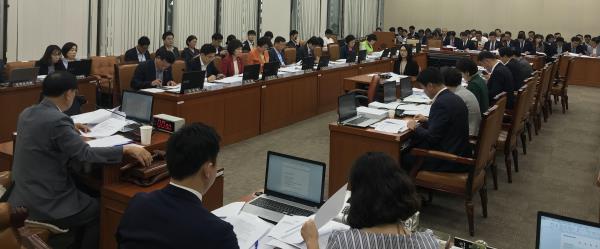South Korea’s guidelines for the treatment of multidrug-resistant tuberculosis (MDR-TB) are outdated compared to those by the World Health Organization (WHO), a lawmaker said.
At the parliamentary audit on Thursday, Rep. Kim Myung-yeon of the opposition Liberty Korea Party said the Korea Centers for Disease Control and Prevention (KCDC) was “too passive” to update the nation’s guidelines in accordance with the latest amendments of the WHO guidelines to raise initial treatment success rate in patients with MDR-TB.

The United Nations held an unprecedented high-level meeting on TB in September. The UN member states unanimously adopted a resolution to end TB by 2030. As part of the effort, the WHO issued the “2018 WHO Rapid Communication,” a new guideline for MDR-TB to be introduced in December.
The new guideline eliminated some injections used in Korea as first-line treatment. New medicines, verified as effective, have been included in Group A where medicines are prioritized.
Kim said Korea should actively adopt the WHO’s revised guideline to minimize the risk of treatment interruption or failure caused by side effects and give patients the benefit of advanced medical technologies.
He criticized KCDC for taking a conservative stance in reviewing an update of the guidelines. The KCDC said it would take time to receive approval for new medical technologies from the Ministry of Food and Drug Safety and the Health Insurance Review and Assessment Service (HIRA).
The KCDC is skeptical about a change, particularly because administering expensive new medicines would increase the government’s spending on healthcare.
The KCDC estimates that new medicines for MDR-TB would require a 30 million won ($26,414) subsidy per patient, which would be translated into a 20.6 billion won state fund for 689 MDR-TB patients as of 2017.
“New medicines included in Group A have been backed by more than 50 papers based on 12,000 patients in 26 countries that assessed the drugs’ safety and efficacy,” Kim said.
He added that considering that 393 patients won approval for new drugs in a preliminary review from May 2017 to September 2018, the government would need only 10 billion won additional spending.
“Choosing the less effective treatment methods will raise hospital admissions and additional treatment, which will lead to a higher treatment cost after all. It is all the more significant to lift the initial treatment success rate when dealing with infectious diseases,” Kim said.

